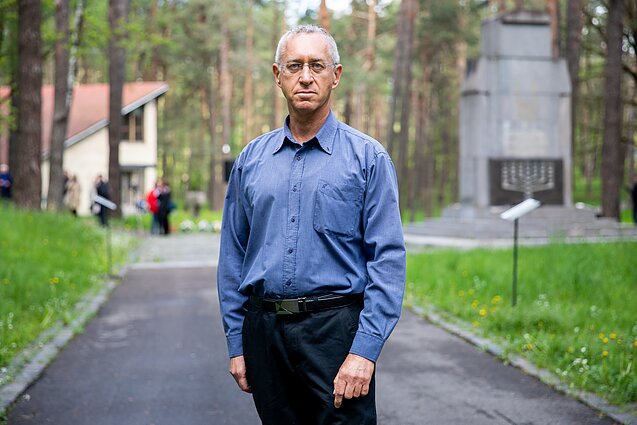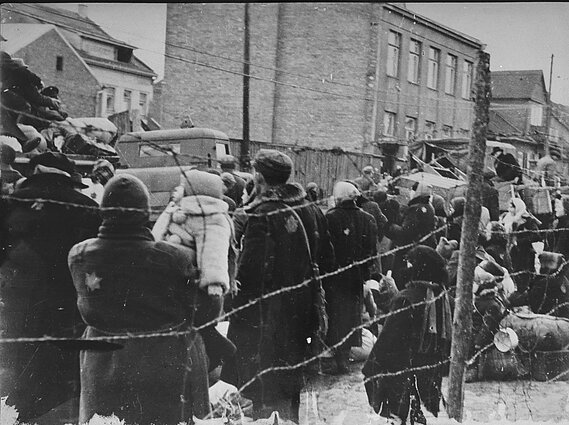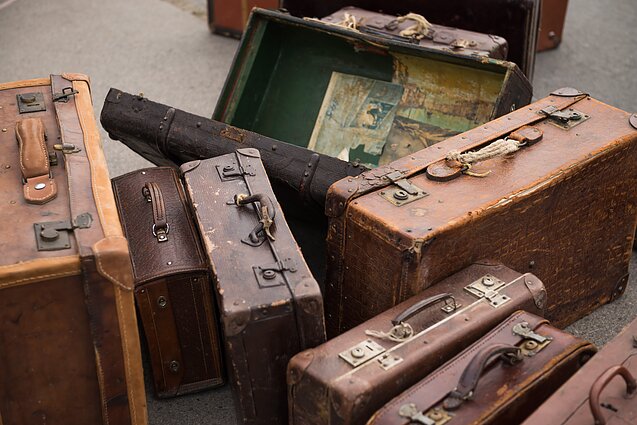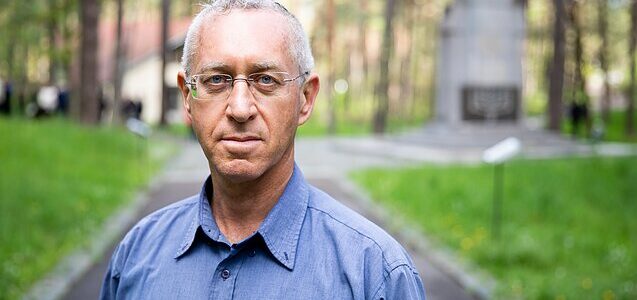Lithuanian State Television and Radio LRT.lt interview with Ben Tsiyon Klibansky
Lithuanians are still heroizing people who took part in the Holocaust, regrets historian and author Ben Tsiyon Klibansky. It’s up to the nation’s leaders to start a long-overdue conversation about these painful pages from the country’s history.
Ben Tsiyon Klibansky teaches at Tel Aviv University and researches Eastern European Jewry. This is now a lost world, and the Jews of Lithuania were the cornerstone in this world, Klibansky tells LRT.lt, something he feels it to be his duty to research.
You were born in Lithuania, Vilnius, but now, you live in Israel. Could you tell me more about your connection to Lithuania?
My family was a traditional family. My grandfather was a spiritual leader of the community. … I was a student at the Antanas Vienuolis School for two years, then my parents got permission to leave Lithuania and immigrate to Israel, which had been their dream for many years.
You should understand that it wasn’t because they hated Lithuania, but because of the prophecies of the prophets Isaiah and Ezekiel, who promised one day we will return to the land of Israel and settle there again. They tried to get permission to leave Lithuania and go to Israel, but it was Soviet Lithuania and the Soviets didn’t let them to go. It took them 13 years, from 1956 when they returned from Siberia until 1969. …
After I finished high school in Israel I started studying at Tel Aviv University. I studied electronic engineering. I joined the army and served for many years. I was a high-ranking officer in the army and when I finished my army service, I got a very good contract in the industry.

Ben Tsiyon Klibansky, photo by D. Umbrasas courtesy LRT.lt
But I began to think, the majority of Jews had been murdered, and no one was left. I’m perhaps one of the very few who survived. My parents were deported to Siberia, but in some way we are survivors, therefore it would be important for me to investigate and research the history of Lithuanian Jews because there was no one else to do it. …
So, I began to think about studying this subject. I left [that job] and I began to study Jewish history for a PhD at Tel Aviv University. … Lithuanian Jewry was the cornerstone of the Jewish world, it was a very important part of Jewry, maybe the most important, it’s unbelievable. …
You’ve written you feel it’s your “sacred duty to study and tell the world about the history of this lost world of Jews of Lithuania. You were born in Lithuania, Vilnius. Do you still feel a connection with Lithuania? Is this why you decided to study the history of the Jews of Lithuania?
[paraphrase translated from Lithuanian:] Yes, it will sound like a cliché, but a visit to Lithuania is a moving event for me, because it means a lot more to me than just that. I was born here, my family’s roots in Lithuania reach back hundreds of years. So I do feel like I have a strong connection to this place.
Of course I do live in Israel now, I am a Jew, but I feel warm feelings towards Lithuania. After 1990 my mother and I came to Lithuania, she was born in Kaunas and spent her entire youth here, until she was deported to Siberia. We returned to Lithuania together and visited the Hebrew Gymnasium in Kaunas, I found our family archives [there]… I feel I have the duty and mission to write about this. [end of paraphrase]

Kaunas ghetto in Slobodka during Holocaust. Photo courtesy US Holocaust Museum/Kaunas Ninth Fort Museum
You have been researching East European Jewry in the 19th and the 20th centuries. What were their lives like before the war? What was the relation between Lithuanians and Jews?
If we are talking about the interwar period … there was no difference between Jews who lived in Kaunas and Jews who lived in Polish Vilnius, for example, my grandfather lived in Kaunas and his brother lived in Vilnius. …
They had many assistance organizations to help old people, to help ill people, to give money to poor people. There were many social organizations that Jews established. I think this is very important. The community wasn’t separated.

Jewish suitcases/Shutterstock
When my mother and father were deported to Siberia–they hadn’t known each other before that–there were around 180 Jews there. … The purpose of that place was to catch fish and send it to the army while they were fighting against the Nazis. My grandmother used to compel, let’s say, everyone to give a share of their fish for disabled women with children who couldn’t catch fish.
The community acted as a community, and we can see it right away in Siberia, when they were far away, and they built exactly the same institutions with each other. But it didn’t happen in the other communities, Lithuanians, Russians, Finns from Finland. They didn’t establish such united communities. The Jews knew how to do it because they used to do it in Lithuania.
I think this is one of the most important things, it helped people survive. If you didn’t have fish, you died. You got vitamin C and other things from the fish. …
Here in Lithuania communities were also intertwined with each other. Lithuanians and Jews were neighbors for years. And then the war started. Some Lithuanians took part in the Holocaust, people killed their neighbors, people they knew from school.
What happened? What had changed in relations between Lithuanians and Jews?
It’s a very good question. I think the relations between Jews and Lithuanians in small towns were good. Again, I don’t want to say it was good in all places, but it was in most places. Non-Jews would enter the houses of Jews, they helped each other–not like a community, but from time to time.
What happened in 1941? What caused neighbors to change their attitude? I think there are several reasons. One of the reasons was the Soviet occupation of Lithuania. They occupied Lithuania and they were here for almost a year. Jews got some jobs in the new regime. Although the Soviets tried not to give them too many positions … Jews got many positions in the new government. Research shows that it wasn’t a high percentage, but before the Soviet occupation Jews couldn’t get a job in the governmental administration. Seeing Jews in the new administration could annoy Lithuanians.
The second reason is the deportations. Three people would come to every house of those who were to be deported. And some of them were Jews, for example, the one who expelled my father was named Blochas, I think he was a Jew. For my father it didn’t matter, but for a non-Jewish person [it might appear significant]. Rumors were spreading and people said that Jews were deporting them. Soviets or Bolsheviks became synonymous with Jews. Of course there was also German propaganda. … When the Nazis invaded Lithuania, people got the opportunity to take revenge on Jews.
So, Jews were scapegoated for all the bad things which happened, and Lithuanians found someone to blame?
Yes, but not only that. Neighbors saw that Jews had become nothing, no one protected them. During the first weeks [of the Nazi invasion] in every town Jews were taken for slave labor, to cut trees or something like that, and they didn’t get any money. They were beaten by local Lithuanians and then by the Nazis.
People saw that they could gain something, enter Jewish homes and take good things, silver, candlesticks and so on. So neighbors became enemies. And this was one of the main reasons for what happened, that many Lithuanians took part in this. …
It was the same process in almost all towns: Jews had to wear a yellow star of David, then they began to work forced jobs, and then they were herded into synagogues or other places and massacred in the pits. It was a process, and during this process Lithuanians began to take more and more part in it.
One of the explanations given for why Lithuanians took part in the Holocaust is that they were threatened and scared of being shot if they didn’t participate. Could this fear be the reason why Lithuanians killed Jews?
I don’t think anyone really threatened them to participate in the Holocaust. But they were threatened that if they helped Jews, they could be killed or pay a very big fine, so people were afraid to help Jews.
In summary, they were not threatened to take part in the Holocaust, this is not true. But they were threatened to not help the Jews.
Was Lithuania any different from other Nazi-occupied countries?
What happened in Lithuania was that 96 percent of Jews were killed. It doesn’t mean that they [Lithuanians] were more cruel than the Latvians or the Ukrainians, or the Croatians. But yes, there are many testimonies that they were very cruel.
I don’t know why. Maybe the Soviets and the deportation and the propaganda contributed to this. … I can’t explain what happened here. Towns were massacred, and there are many testimonies that Lithuanians didn’t waste bullets on small kids, they would smash their heads on trees or throw them in the air and shoot them. Unbelievable. How can a human being do it? I don’t know. So, I don’t have an explanation for it.
I think it’s very difficult for Lithuanians to accept this part of our history. Why do you think there is still denial that Lithuanians took part in the Holocaust? Is it because of a lack of discussion?
It’s a good question. I think it comes from the top. … It’s very difficult to accept that my grandparents or an uncle or someone else was part of this terrible thing. So, we say the Nazis did it and some other bandits in Lithuania. It’s very difficult to accept this idea, and the government doesn’t help to open this discussion up.
I know there are discussions about it in some gymnasia [high schools] and other places. But it’s very difficult and must come from above, it must come from the government politicians, they must say one day: let’s learn what really happened and not deny it.
What happens today is that the murderers of Jews in the Holocaust become heroes, because after that they also fought against the Soviets. They get monuments built and places called after them. No one mentions that they massacred their neighbors. Jews were loyal citizens of Lithuania, I don’t think that any Jew did any harm to Lithuania.
So you think the government and local authorities could do more?
Yes, I think this is their task. … I think that when people in the high levels change their attitude, then there will be an open discussion. And when you know what happened, you can correct it. But if you deny it, you can’t correct it. This is the real problem.
You mentioned monuments to people who took part in the Holocaust. How do you feel looking at those monuments and knowing that they’re still here in Lithuania?
For me, it’s terrible. There is a monument for Jonas Noreika in Vilnius. We know that he was responsible for herding the Jews in Šiauliai and other places to kill them. So how can he be a hero? When I was a child, my heroes were Mindaugas, Vytautas, and Gediminas. But now there are new heroes that are not heroes in my eyes. They are murderers.
Full interview here.


